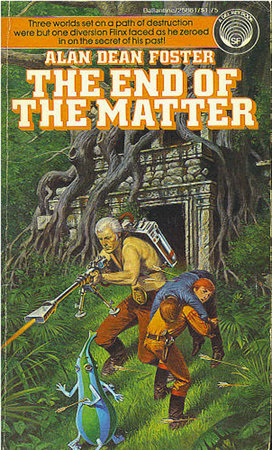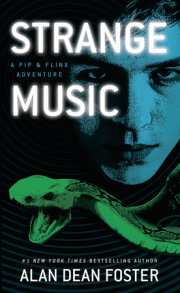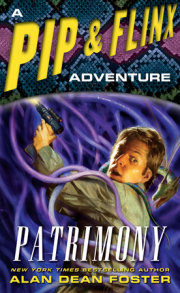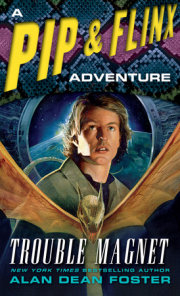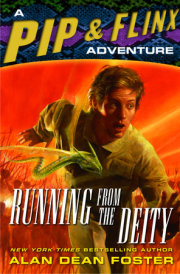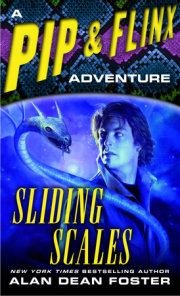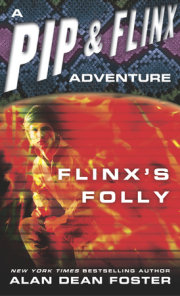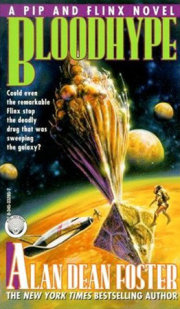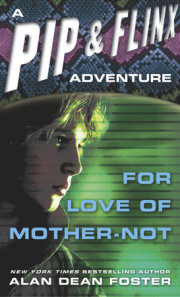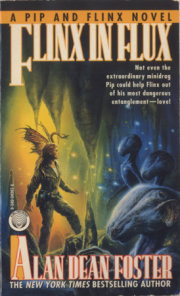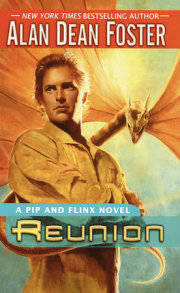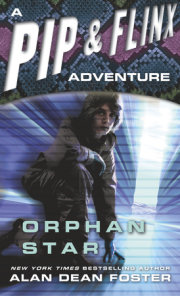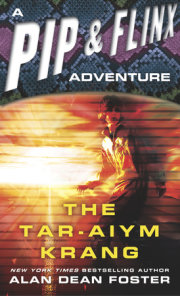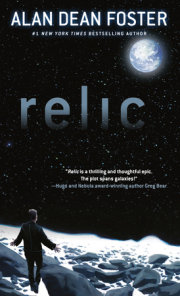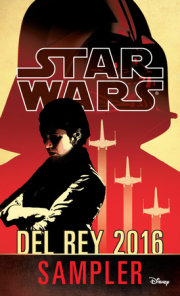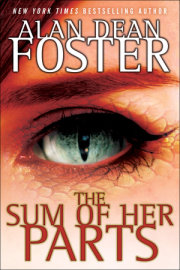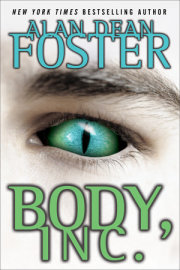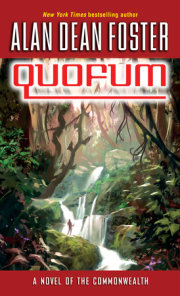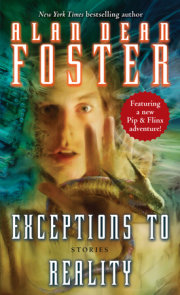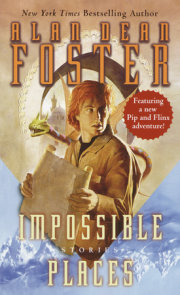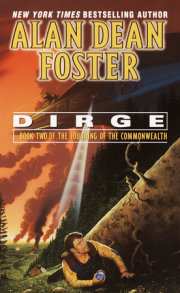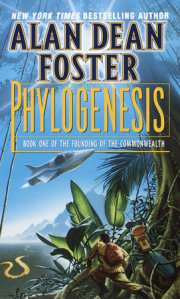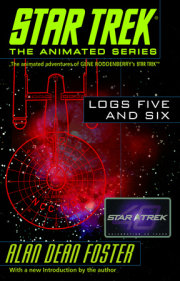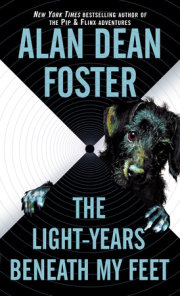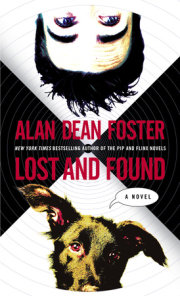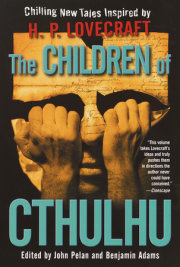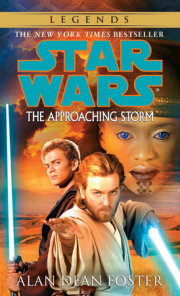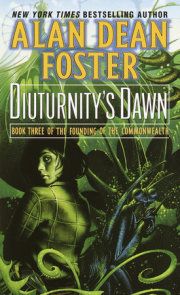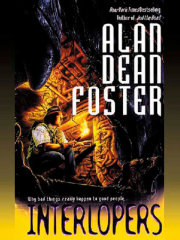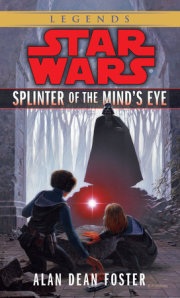Chapter One
“Your offer,” the withered woman screamed, “is worthy of a kick in the groin!” She lowered her voice only slightly. “However, I am an old, weak woman. You are younger, larger, stronger, healthier, and wealthier.” One hand curled defiantly around the hilt of a crooked blade jutting out from a hole in the dirty brown rag of a skirt. Her other hand held the object under discussion. “So what am I to do?” she finished expectantly.
“Please don’t get so excited,” the young man standing across from her pleaded, making quieting motions at her with his hands as he looked nervously from side to side.
No one in the shifting mob of sidewalk vendors and buyers was paying any attention to the argument. But, being an outworlder, the young man was sensitive to the old lady’s accusations. After all, he and his bride were scheduled to be on Moth for only three days before moving on to New Paris with the rest of the tour. The last thing he wanted was to be thrown in jail, on his honeymoon, for fighting with one of the locals.
“Really,” he explained desperately to her, adjusting his rain-soaked mustard-and-puce weather slicker, “thirty credits is all I can afford. Have some sympathy for me. My wife is back in our hotel. She’s not feeling very well. The daily rain and constant cloud cover is depressing her, I think. I want something to cheer her up. But we have a long way to travel yet. Thirty credits is all I can afford for a trinket.”
The old woman proudly drew herself up to her full height. Her eyes were now level with the young man’s chest. She held the object of contention firmly in one hand as she shook it accusingly at him. The slim, graceful bracelet of some silvery metal was inlaid with fragments of polished wood and stone.
“This wristlet was worked and set by Cojones Cutler himself, infant! Do you have any idea, any idea, what that signifies?”
“I’m sorry,” the youth tried to explain, sniffing, “but I’ve been trying to explain all along that I am only a visitor here.”
Clearly the woman restrained herself only by some great inner effort. “Very well,” she said tightly, “never mind the honored name of Cojones Cutler.” She indicated the oval bulges set in the bracelet. “Look at these whirlwood cabochons—forget the topazes for now.” As she turned the bracelet, the naturally hardened, polished sap facing the wood broke the dim daylight into points of azure-and-green fire.
“Hardly a tree in a million has the genetic deficiency necessary to produce such colors, boy. Hardly one in a million, and those grow only in the far north of Moth, where the nomads hunt the Demichin devilope. Why, it takes—”
“Oh, all right.” The young man sighed, exasperated. “Anything to get this over with. Thirty-five credits, then.” He couldn’t have been more than twenty-two or twenty-three. His face was soft and earnest. “We’ll just have to stay at a lower-class hotel on New Paris, that’s all.”
The old woman stared up at him and shook her head in disbelief. “You talk of hotels, and me with three starving children and a husband long dead. You can stand there and talk of hotels, brazen child, while offering me thirty-five credits for the finest bracelet I’ve been lucky to get on consignment in twenty years. Twenty years!” Her voice rose to a hoarse shout again. “Make me a decent offer or go room with the devil, I say!” she screeched, loudly enough to turn a few heads in the crowd. “But don’t stand there innocently and insult a poor old woman!”
“For Church’s sake,” the youth pleaded, “lower your voice.”
Sheltered beneath a rain cape of violet-gray charged slickertic, the young man who had been idly observing the noisy byplay of buyer and seller licked the last sweet traces of thisk-cake honey from his fingers. Then he rose and sauntered toward the quarreling pair.
Slightly under average height, with smoothly arcing cheekbones and deeply tanned skin, he did not present a particularly eye-catching figure. A thatch of curly red hair roofed his skull, hair the color of a field of fireweed on the open tundra. It tumbled over his forehead and ears. Only the odd movement of something under the right side of his rain cape indicated anything out of the ordinary, but the object—whatever it was—was too well concealed to be identified.
“. . . and if there’s nothing better you can say,” the old woman was raving on, “then you’d better—”
“Excuse me,” a quiet voice interrupted. “I’d say thirty-five credits for that bracelet is a fair price.”
Mouth agape in puzzlement, the young husband stared, uncomprehending, at the slim youth, and wondered why a native should interfere on his behalf. The old vendor turned a furious gaze on the brazen interloper.
“I don’t know who you are, sir,” she rumbled dangerously, “but if you don’t mind your own business I’ll—” She stopped in mid-sentence, her mouth frozen in an O of shock.
“You’ll do what, old woman?” the youngster asked. “Send me to bed without supper?”
Sensing an advantage without knowing its origin, the dazed bracelet-buyer was quick to act. “Thirty-five credits is really a fair price, as he says.”
“Yes . . . I . . .” The old woman, appearing a little stunned herself, hardly seemed to hear the offer. “Thirty-five, then, and be done with it.”
“You’re certain?” The outworlder, now sure of his purchase, was anxious to ingratiate himself with the seller. Since he was a good deal bigger than the new arrival, he took a step forward. “If this boy is intimidating you, I’d be glad to . . .”
Something moved and partially emerged from cape folds. It was leathery, thin, and brightly colored. Without actually recognizing the object, the outworld tourist nonetheless had an immediate impression of serpentine lethality. His hand proffered his credit slip instead of closing into a fist.
“Here’s your money, then.”
Mesmerized by the caped figure, the old woman mechanically processed the credit slip through her cardmeter; she handed it back to the buyer without even troubling to check the reference number.
“The bracelet,” the young visitor urged impatiently.
“Hmmm? Oh, yes.” She handed it over. Flushed with pleasure at his imagined bargain, the tall tourist vanished into the milling crowd of humans and aliens.
Slowly the old woman studied the unimposing figure standing before her. Then she abruptly threw thin but still muscular arms around him and squeezed tightly. “Flinx!” she shouted exuberantly. “Flinx, boy, you’ve come home!” She shook the lanky youth out of sheer joy, for the familiar feel of him. Jostled, Pip the minidrag shifted uncomfortably on Flinx’s shoulder and attempted to tolerate the roughhousing with fine reptilian indifference.
“For a little while, Mother Mastiff,” the youth replied quietly. He grinned and nodded in the direction of the departed outworlder. “I see you’re having as much fun as ever.”
“Fun!” she snorted derisively, making an obscene gesture in the general direction of the marketplace into which her customer had disappeared. “Pathetic, most of them. They suck the enjoyment from trading. Sometimes I wonder how the Commonwealth hangs together, with cement like that.” A triangular head flanked by eyes of fire peeked out from beneath the slickertic. The old woman eyed it with evident distaste. “See you’re still dragging that creature around with you.”
Pip responded with a nasty hiss. There had never been any love lost between Mother Mastiff and the minidrag.
“Many times I think it’s Pip who drags me, Mother,” the youth argued.
“Well, no matter perversions I can’t cure you of, boy. At least you’re here.” She whacked him on the left shoulder in mock anger. “Here you are . . . you good-for-nothing, forgetful, heartless lump of immature meat! Where have you been to? It’s been over a year. A year, paragon of ingrates! Not a tridee tape, not a card, nothing!”
“I am sorry, Mother Mastiff,” he confessed, putting his arm around her bony shoulders. She shrugged angrily, but not hard enough to dislodge his arm. “It wasn’t that I didn’t think of you. But I was far from modern communications.”
“Ah, in trouble again?” She shook her head. “Is that the way I raised you?” He started to reply, but she cut him off hastily. “Never mind that now. Where were you? Come, tell me back at the shop.”
They started down the street. Aromatic scents and the cries of Drallar’s inner marketplace filled the air around them. “Come, boy, tell me, where were you, that you couldn’t let me know if your worthless carcass was still intact?”
Flinx considered his response carefully. He had good reasons for wanting to keep his whereabouts of the past year secret. What Mother Mastiff didn’t know she could never reveal.
“I took a job, sort of,” he finally explained.
Copyright © 2002 by Alan Dean Foster. All rights reserved. No part of this excerpt may be reproduced or reprinted without permission in writing from the publisher.

